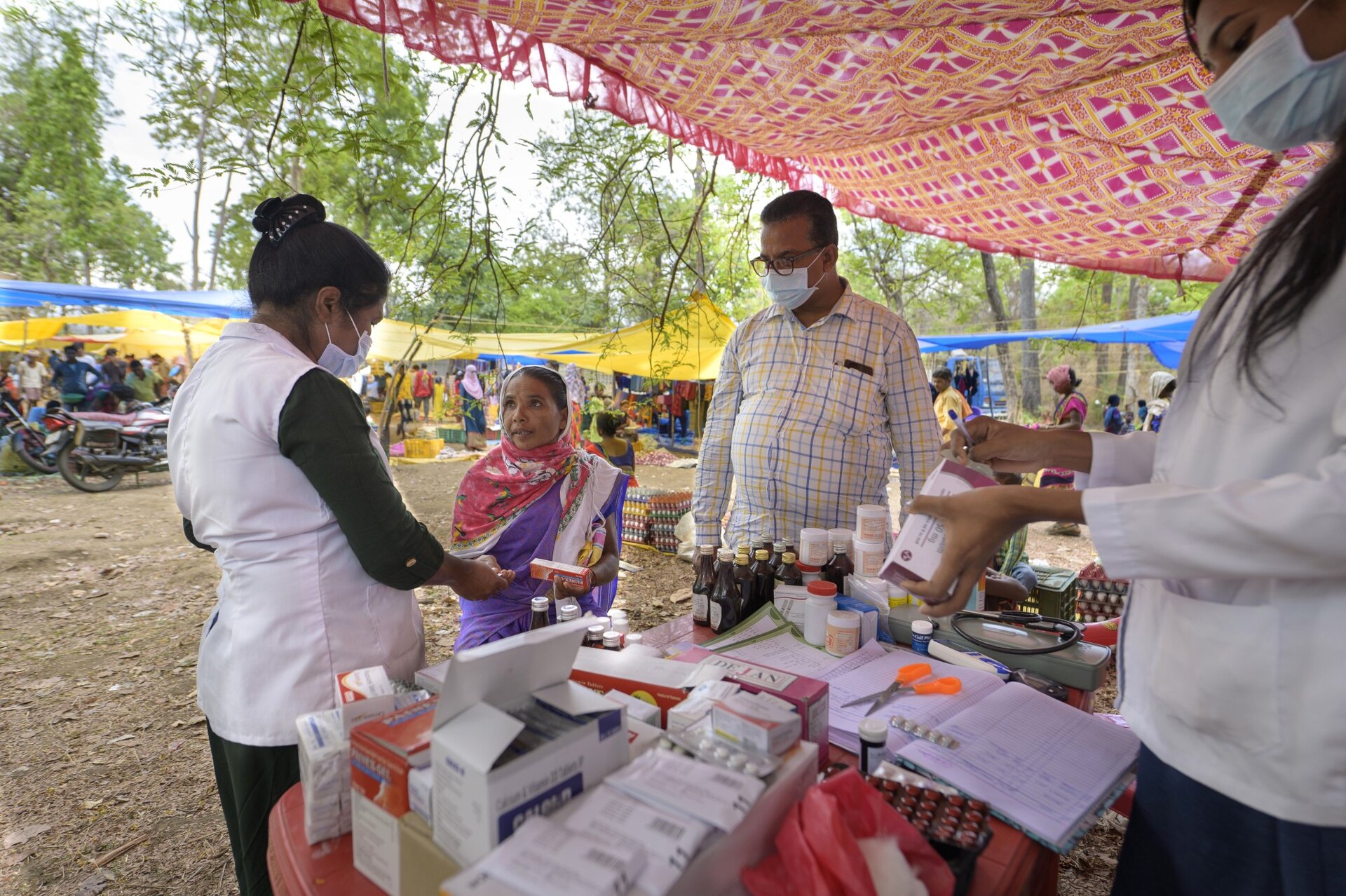Mr Telamukta lives in Chichalgondi, a remote village in Chhattisgarh, India. He had never sought medical attention for his swollen legs and breathlessness because he was simply too far away to visit a health care centre. One day, he noticed something different in his local Haat Bazaar community market, to which he travelled weekly to get his family’s groceries. A mobile medical unit was offering check ups and treatment.
“On visiting this Haat Bazaar clinic, I was informed that I have diabetes and hypertension. Now I am feeling better after taking the medicines. Coming to this location has proven advantageous for me, as the doctors were able to identify the underlying issue of my condition. This is why I make regular visits here to get my medications,” said Mr Telamukta.
In Chhattisgarh, populations living in remote and rural areas are unable to travel the long distances to health clinics and had limited opportunities to address their diseases and health conditions.
Today, thanks to a strong primary health care (PHC) intervention by the State Government, about 18 million people now have access to mobile health clinics through weekly community markets known as Haat Bazaars. This incredible step to provide diagnostics and treatment free of charge to the entire population brings India closer towards achieving universal health coverage (UHC).
Primary health care where people need it most
The weekly Haat Bazaars of Chhattisgarh are a traditional form of barter system for the local population. People walk long distances to sell their forest or agricultural produce, buy household supplies, and assemble to exchange news and information. The markets are fundamental for commerce and provide many opportunities for social and cultural exchange between different communities.
The Chhattisgarh State Government saw these markets as a great opportunity to bring PHC services closer to the people who need it most. In 2019, they launched the Mukhyamantri Haat Bazaar-Clinic Scheme. Today, hundreds of clinics operate in markets across Chhattisgarh, serving people who have never had access to healthcare before.
With support from the UHC Partnership, WHO has been involved at multiple stages of policy design and implementation for the scheme in coordination with the Government of India. WHO provide technical support in coordination with health authorities in three districts to roll out the clinics, analysed the impact of the work on service delivery, and fed back findings to improve the initiative’s design and implementation.
Over 3 years, more than 95 000 people have received health check-ups, and treatment where necessary. As of May 2022, a total of 1 888 clinics are in operation covering a population of 18 million people.
A range of health services free of charge
Medical teams who operate the clinics include doctors, community health officers or mid-level health workers, pharmacists, nurses, and drivers. The clinic provides maternal and newborn care, immunization, treatment for common illnesses such as fever, scabies, cold, cough, diarrhoea, malaria, anaemia, and screening for noncommunicable diseases such as diabetes, hypertension and cancers. When possible, patients can receive medications here or be referred to secondary or tertiary care.
 Credit: WHO/India
Credit: WHO/India
Mitanins are community-level frontline health workers who make home visits in the assigned areas and inform communities about the next scheduled Haat Bazaar Clinic and the services available. The mid-level healthcare workers, along with the Mitanins, also play a vital role in mobilizing pregnant women for antenatal care, and children for vaccinations.
All services and treatment are provided free of charge. The health services are convenient, effective, and affordable to all. This means greater equity in access, and firmly places primary health care as the foundation of a stronger health system overall. This is a big step towards achieving universal health coverage (UHC), where everyone can access the health services they need without experiencing financial difficulty.
The UHC Partnership assists over 125 countries in accelerating progress to achieve UHC through funding provided by the European Union (EU), the Grand Duchy of Luxembourg, Irish Aid, the French Ministry for Europe and Foreign Affairs, the Government of Japan - Ministry of Health, Labour and Welfare, the United Kingdom - Foreign, Commonwealth & Development Office, Belgium, Canada and Germany.
